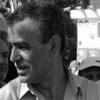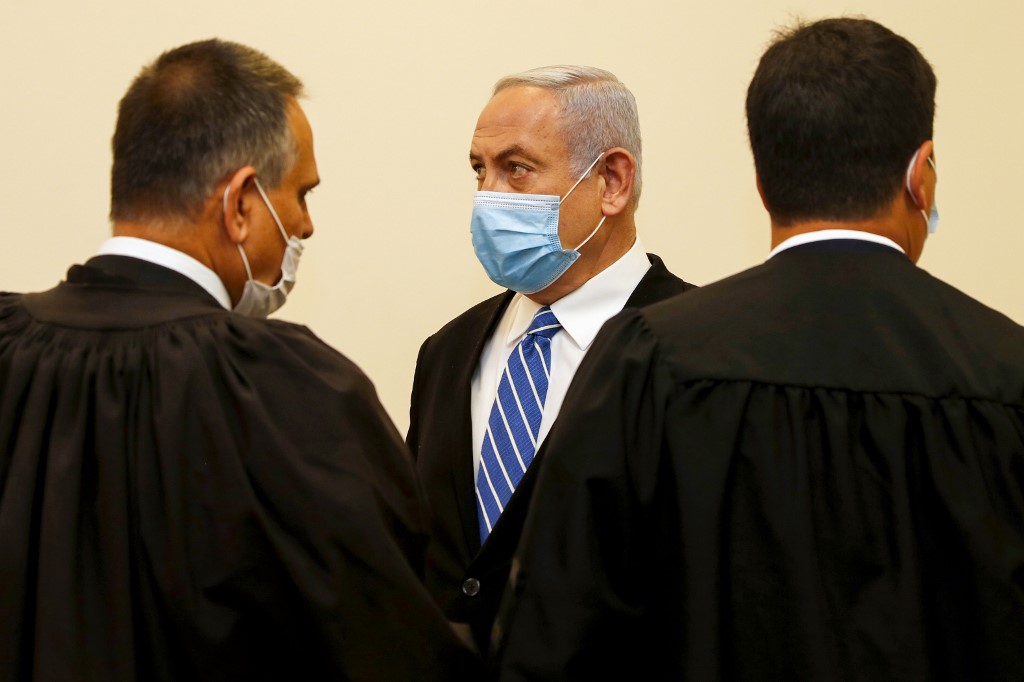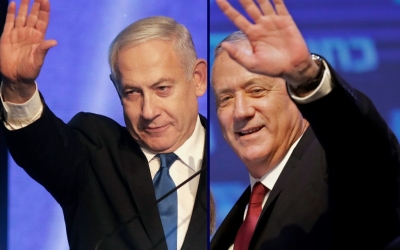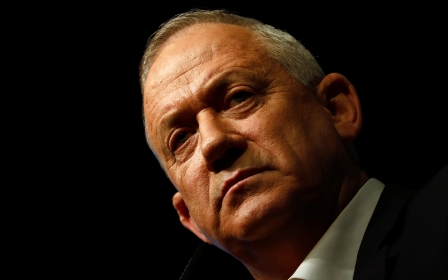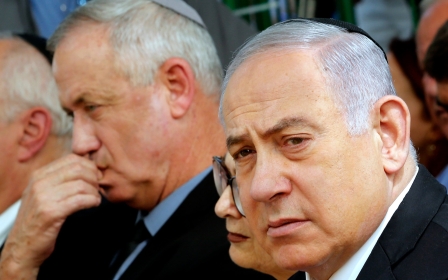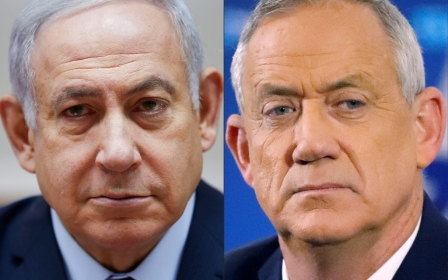Israel's new government is led by a wounded Netanyahu going for broke
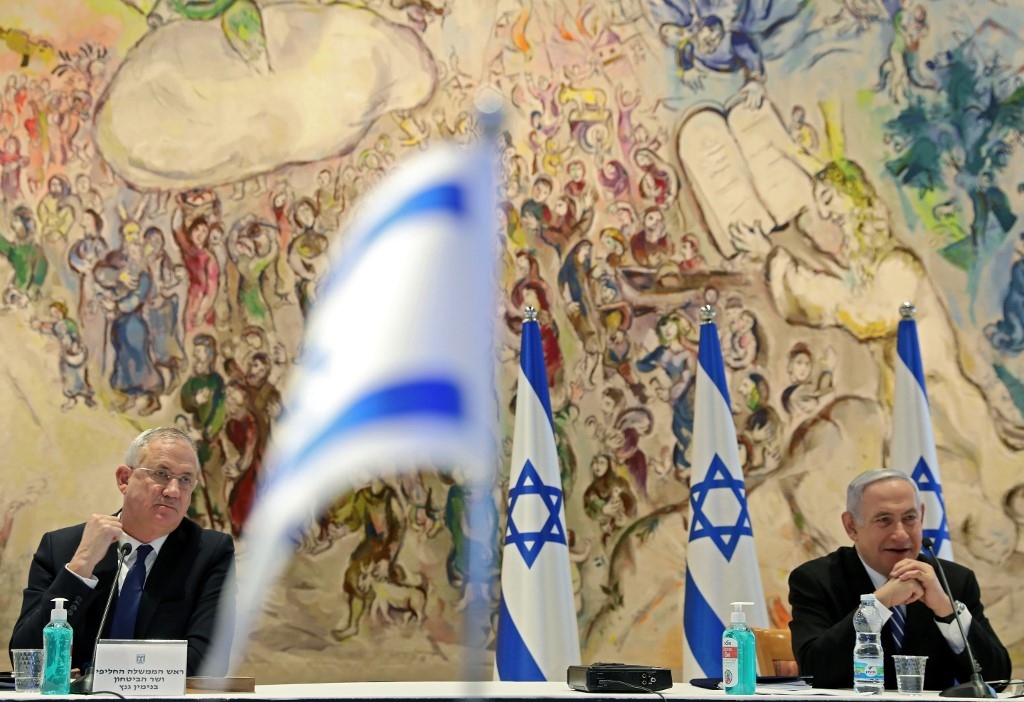
This month’s Knesset vote to approve the new Israeli government ended a year and a half of political crisis, even if temporarily.
The new government is the largest in Israel’s history, with 36 ministers and 16 deputy ministers. Artificial ministries were invented to quench the thirst for power of Likud and Blue and White party leaders, while the prime minister’s seat will be rotational, with Benjamin Netanyahu serving for the first 18 months, followed by Benny Gantz for the same period.
The new government is equally split between the two parties, but in reality, Netanyahu remains dominant. And despite the overt commitment, it is likely that he will not implement the rotation arrangement, finding a pretext to cling to power and head into a fourth election in a manner that suits him.
'Worship the leader'
Netanyahu returned as prime minister after three heated electoral battles during which he was unable to obtain a majority to form a government. What enabled him this time around was Gantz’s withdrawal from previous promises he had made to not participate in a government headed by someone charged with corruption.
New MEE newsletter: Jerusalem Dispatch
Sign up to get the latest insights and analysis on Israel-Palestine, alongside Turkey Unpacked and other MEE newsletters
Gantz justified this by stressing the importance of confronting a health and economic crisis amid the coronavirus pandemic, noting that Israel could not afford an ongoing political crisis.
As a wounded strongman, he becomes more aggressive and destructive, using his power to save himself
In the government-formation process, Netanyahu fragmented ministries and broke up political parties and blocs, dividing them between those who joined the coalition and those remaining in opposition. Likud, however, has remained coherent - an advantageous position, as Netanyahu is the undisputed leader, and no one dares criticise him.
What has developed in recent years in this party is the concept of “worship the leader”, no matter what he does or says - to the point that he can even withstand a series of corruption charges. Those who have tried to compete with Netanyahu have found themselves excluded or marginalised. Important figures such as Gideon Saar, Gilad Erdan (who was pushed to a dual ambassadorship) and Avi Dichter, among others, have been punted outside the inner circle, replaced by less capable politicians willing to serve Netanyahu.
One-man party
In the past, Likud witnessed heated discussions and intense competition, but Netanyahu has turned it into a one-man party. The power he has gained from his party and his massive support base makes him more dangerous, because he has apparently started to believe he was chosen to save the people of Israel - an extreme right-wing narrative.
Netanyahu is more dangerous now because he faces criminal accusation. He is an injured wolf, but still a strong one. As a wounded strongman, he becomes more aggressive and destructive, using his power to save himself.
The new Israeli government carries with it the same old Zionist policies, which have been disastrous for the Palestinian people. It has also deepened the plight for Jews, in a bitter conflict over Israeli occupation and Zionist colonialism.
Israeli policies revolve around the traditional Zionist axis, aiming for a state that is more Jewish but less democratic. The goal is for Palestinians to “lessen” their presence so that the state can be more Jewish, and to lower their voices to preserve the comforting notion of an Israeli “democracy”.
Although these policies have not essentially changed, new challenges have emerged. With respect to the coronavirus pandemic, Israel has exploited this crisis to impose a comprehensive electronic monitoring system on all citizens.
Israel is also in contact with many other regimes, aiming to sell surveillance devices that prop up dictatorial states, while claiming the goal is to preserve the health of citizens.
Economic pressures
In addition, the coronavirus pandemic has ravaged the economy, with hundreds of thousands of people becoming unemployed as many small- and medium-sized businesses have collapsed. Tourism, air travel and the entertainment industry have been severely damaged.
Israel today is more sensitive to economic pressures than ever before. If Europe really wants to deter Israel from annexing territories in the occupied West Bank, it should do so by activating significant economic pressure, which could have a decisive impact on political decisions. Netanyahu’s political history shows that he kneels to pressure when confronted by it.
Israel’s new government will also have to confront the challenge of Iran’s alleged pursuit of a nuclear weapon, and its attempts to expand its influence in Syria. Yet, while there is much discussion in Israel about cooperation with Arab countries against Iran, no analysts or politicians have expressed concerns that the annexation project could affect this cooperation.
The most important challenge, however, is Netanyahu’s plan to extend Israeli sovereignty over the Jordan Valley and settlements, which is a priority for the new government. Netanyahu considers the annexation project to be the most important of his political career.
Some believe this step could destroy the two-state solution and bring the one-state solution closer, but this is not true; deepening the apartheid regime does not automatically accelerate liberation. The active, mass struggle for freedom and justice is the path to liberation.
What is required now is a severe shift in the Palestinian national liberation strategy: nullifying the Oslo Accords, revoking recognition of Israel, ending security coordination, solving internal divisions, and unifying the struggle of Palestinians everywhere: the West Bank, Jerusalem, Gaza, those in exile and Palestinians inside Israel.
The death of Oslo
The new Israeli government will also be faced with the challenge of the International Criminal Court (ICC), which Netanyahu has labelled a “strategic threat”. He has appointed a minister to handle Israel’s strategy in confronting the ICC.
Netanyahu’s strategy includes embroiling the US in a direct confrontation with the ICC. Since the annexation project is inconsistent with international law, Israel’s “legal” claim today is that annexation is a US project with international legitimacy that Israel is implementing - the “deal of the century”. In short, Israel does not want to face the court alone.
Amid this bleakness, there are points of hope, including pressure on Europe to move against Israel's expansion, and supporting and strengthening the boycott movement
For decades, the Oslo agreements defined the relationship between the Israeli occupation and the Palestinian people. But this period has ended; all that remains is the official announcement of the time of death.
There is no life for Oslo after today - no life for the mirage of the peace process. Israel’s only offer to the Palestinian people is to surrender and recognise the legitimacy of the Zionist project, and to thank it for allowing them the crumbs of their homeland.
Amid this bleakness, there are points of hope, including pressure on Europe to move against Israel’s expansion, and supporting and strengthening the boycott movement. But the most essential element is reunifying the Palestinian struggle, to build a comprehensive and binding national strategy free from the shackles of Oslo. That is where we must begin.
The views expressed in this article belong to the author and do not necessarily reflect the editorial policy of Middle East Eye.
Middle East Eye delivers independent and unrivalled coverage and analysis of the Middle East, North Africa and beyond. To learn more about republishing this content and the associated fees, please fill out this form. More about MEE can be found here.


